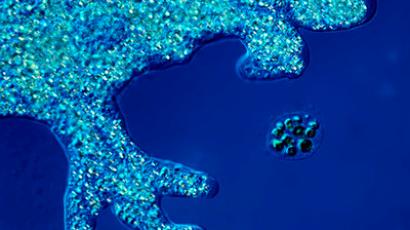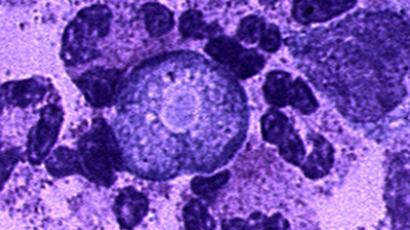Simple amoeba can help fight Alzheimer's – research

Scientists have discovered a way to study the causes of Alzheimer's disease by using a simple single-celled amoeba which leads to a better understanding of how human proteins mutate. The new method circumvents the need for animal testing.
British scientists point to the possibility of amoeba use in biomedical studies of the presenilin protein, which plays a part in causing Alzheimer's disease - a form of dementia that is widespread among the elderly. A press release about the study conducted by researchers from the Royal Holloway University of London and the Institute of Psychiatry of King’s College, London, was published in the Journal of Cell Science on Friday.
It reveals that the so-called 'social amoeba' has become an essential source in the understanding of how human proteins function and whose mutations are associated with the development of dementia. It could lead to the creation of a new generation of treatments for the incurable disease.
Professor Robin Williams, a scientist from Royal Holloway, elaborates on the idea of using amoeba in medical research of epilepsy, saying, “This discovery allows us to examine the role for the human presenilin 1 protein, without the use of animal testing. It is amazing that so simple an organism lends itself to the study of such a complex disease."
Animals are commonly used in Alzheimer's research, but such experiments are problematic due to their cost, the time they take, potential protests from animal rights activists, and the fact that animal cells become non-viable after deletion of the proteins being studied.
Alzheimer’s disease is the most common dementia type in people over 65. It develops when nerve cells in the brain die or no longer function normally, causing changes in one’s memory, behavior, and ability to think clearly. It was first identified more than 100 years ago, but the precise changes in the brain that trigger the development of Alzheimer’s and the order in which they occur remain largely unknown. Individuals progress from mild Alzheimer’s disease to moderate and severe cases at different rates. The disease eventually leads to death.
On the contrary, the social amoeba Dictyostelium - which occurs naturally in forest litter in temperate regions - provides a cheap source for research because it can be grown in a laboratory and used as a single-celled body, or a formation of a fruiting body consisting of around 50,000 cells. Both methods are needed in a range of biomedical projects ranging from Alzheimer's to bipolar disorder research.
Dr. Richard Killick, the article’s co-author from the Institute of Psychiatry King’s College, said, “This work on the amoeba, Dictyostelium, shows we can successfully use this simple model to try to better understand the normal roles of other proteins and genes involved in Alzheimer’s disease and other forms of neurodegeneration."
The brain degeneration caused by mutations in presenilin proteins only worsens with the aging process. Those mutations, thoroughly analyzed by scientists over the past 30 years, can also cause inherited forms of Alzheimer's disease, which, according to the report, is the sixth-leading cause of death in the USA.














